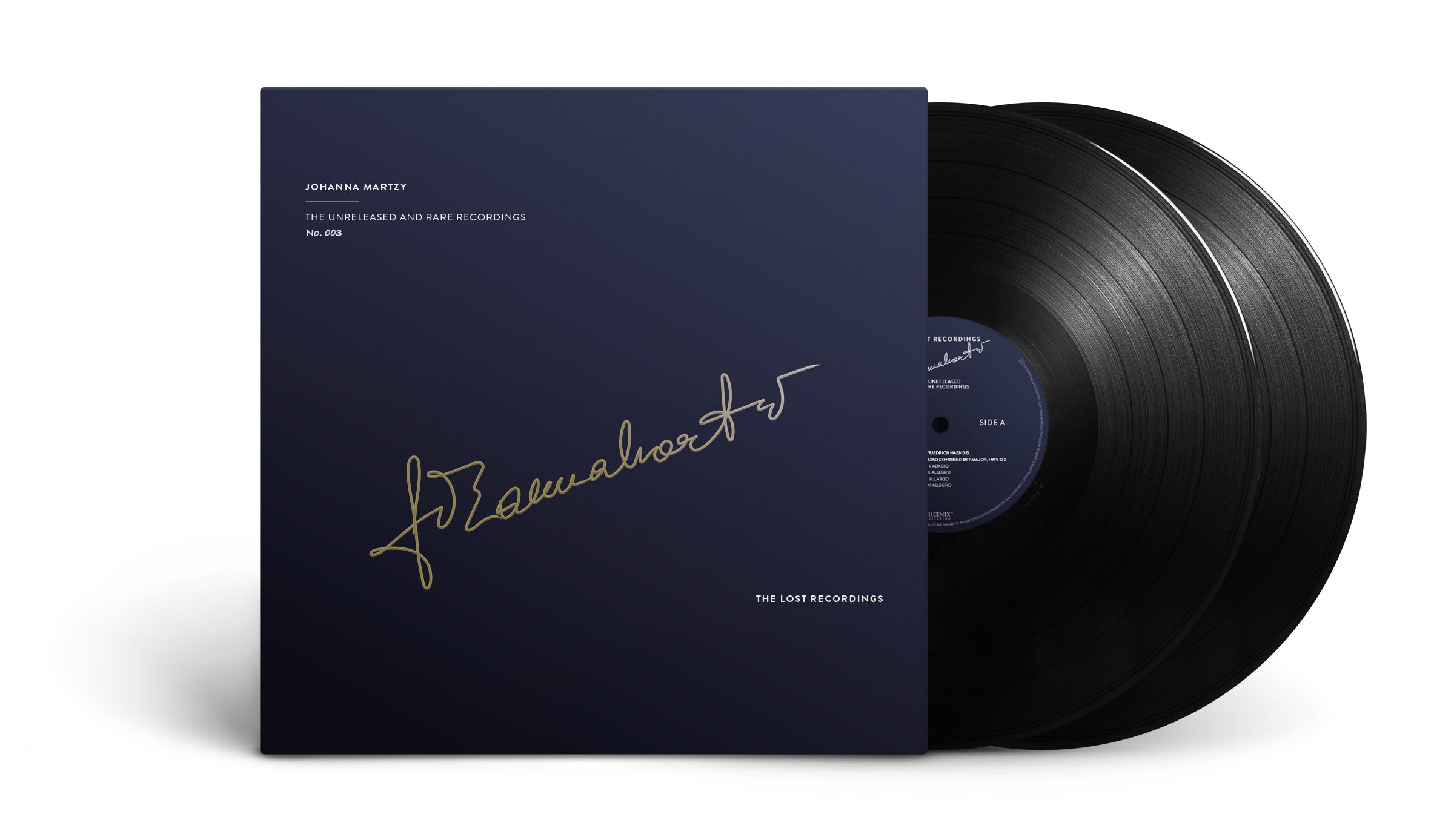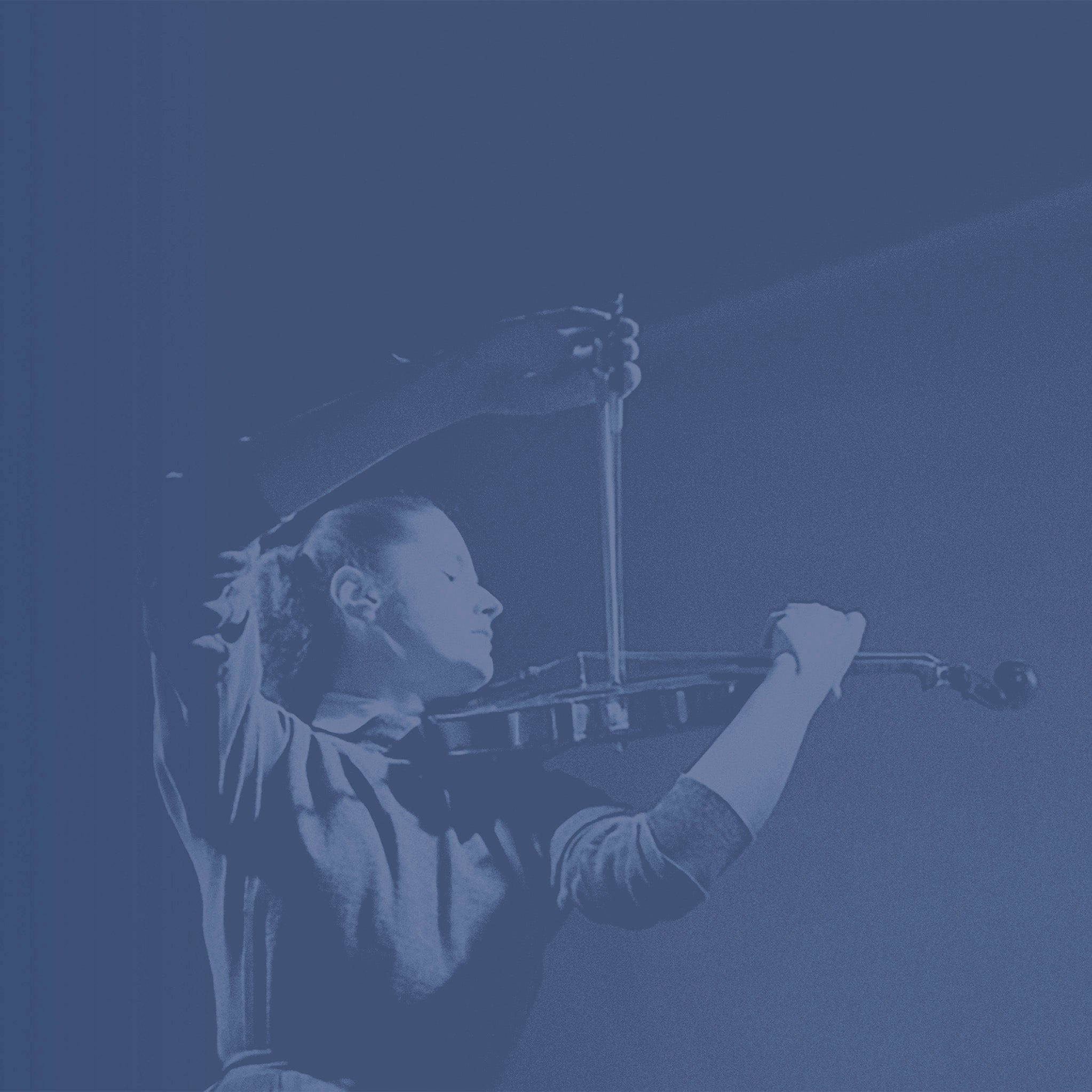Johanna Martzy
THE UNRELEASED & RARE RECORDINGS
Johanna Martzy - le scintillement du Météore
« Dieu
t’a tout donné, tu dois compter parmi les dix plus grands violonistes de ton
époque ». C’est ainsi que parlait Jenő Hubay, le professeur Johanna Martzy à
l’Académie Liszt de Budapest. Elle avait 13 ans. Comment se douter alors que son
destin sera celui d’une comète traversant une succession ininterrompue de
lumières et d’ombres ? Tout va très vite. En 1943, à Budapest, sous la direction
du grand Willem Mengelberg, elle apparait pour la première fois dans le concerto
de Tchaïkovski. Mais l’arrivée des Nazis dans une Hongrie encore protégée arrête
cet élan : la jeune juive et son mari sont envoyés dans un camp autrichien
jusqu’au terme de la guerre. Se souvient-elle alors de la prédiction de son
professeur ? Elle reprend son violon et, en octobre 1947, remporte le premier
prix du concours de Genève. Le succès est à portée d’archet. Amsterdam en 1949,
Londres en 1953, New York en 1957 puis en 1958 sous la direction du jeune
Leonard Bernstein. Les déboires cependant se multiplient : elle affronte une
cabale permanente concernant des affinités politiques soi-disant douteuses avec
le régent Mikklos Horthy dans la Hongrie de la seconde guerre mondiale. A
Édimbourg, en 1959, l’Orchestre Philharmonique tchèque refuse de se produire
avec elle. Par ailleurs elle enregistre peu, conséquence de démêlés orageux avec
les maisons de disques. Les critiques musicaux non plus ne l’épargnent pas :
certains trouvent son talent « trompeur » ! Sa carrière devient chaotique,
alternant ovations et ignorance. Au milieu de cette tourmente, la fière Johanna
ne cède à aucun compromis. Rester authentique, voilà sa ligne ! Elle n’y
dérogera jamais.
The Lost Recordings a eu la chance de pouvoir
ressusciter à Berlin et Amsterdam des d’enregistrements studio ou concert
inédits entre 1955 et 1965, qui témoignent du talent exceptionnel de Johanna
Martzy. Étant donné l’ancienneté de ces documents, des efforts de restauration
significatifs ont du être déployés pour faire revivre la profondeur et l’éclat
du jeu de cette comète de l’espace musical.
En 1955, dans la chapelle
Jesus- Christus de Berlin, elle enregistre, avec au piano Jean Antonietti, la
sonate pour violon et basse continue de Haendel ainsi que la sonate en si bémol
majeur de Mozart. Des tempi rigoureux, dépourvus du maniérisme si fréquent à
cette époque, font écho à la recherche des sonorités musicales les plus
colorées. Ainsi, chaque phrase devient un monde riche par lui-même. Le 25
novembre 1961, elle est au Concertgebouw d’Amsterdam. Willem van Otterloo dirige
le Radio Filharmonish Orkest. Johanna a souvent été éreintée pour
l’interprétation de ce concerto qu’elle affectionnait particulièrement. Le
présent document montre combien ces critiques étaient infondées. Elle fait
preuve d’une capacité à rejeter tout faux semblant et à habiter une œuvre de
l’intérieur, aussi intransigeante soit elle. Son jeu est limpide, en harmonie
lumineuse avec un orchestre qu’à plusieurs moments elle sait entrainer vers des
sommets musicaux. Émotion parfaite.
On a souvent cru que Johanna
n’osait pas aborder les œuvres des musiciens du XXème siècle. A contrario, elle
montre ici avec quelle vivacité et quel sens du rythme elle rend hommage à Ravel
dans une vision à la fois dynamique et intimiste de sa sonate pour violon,
enregistrée en studio à Hilversum en janvier 1965, toujours en compagnie du
pianiste Jean Antonietti.
1965 marquera le début de son éclipse. Elle
préférera quitter progressivement la scène, trouver refuge en Suisse où elle
décédera, presque ignorée, en 1979, à l’âge de 55 ans. Extrême injustice. Le
grand Glenn Gould voyait pourtant en elle, une artiste qui lui avait toujours
semblé être la plus sous-estimée des grands violonistes de son époque. Une
erreur aujourd’hui réparée.
Record 1
RECORD 2
- Johanna Martzy, violin
- Jean Antonietti, piano
- Willem von Otterloo, conductor
- Radio Filharmonisch Orkest
*Enregistré à l'Eglise Jesus-Christus Kirche, Berlin, 14.XI.1955
MONO ℗ 1955 RBB
Jean Antonietti, piano
**Enregistré au
Concertgebouw, Amsterdam, 25.XI.1961
MONO ℗ 1961 VARA
Willem
van Otterloo, conductor & the Radio Filharmonisch Orkest
***
Enregistré au studio VARA, Hilversum, Netherland, 27.I.1965
MONO ℗
1965 VARA
Jean Antonietti, piano
Remasterisé par © 2023 THE LOST RECORDINGS à partir des bandes
analogiques originales
Gravure 33 tours sur laques: Kevin Gray
Double album vinyle 180g
Galvanisation: United-Kingdom
1ère édition, numérotée à la main: 2000 copies
Nouveau Tip-on gatefold imprimé en Italie
Pressé par Marciac
Workshop Pressings, France
*Une carte de téléchargement de l'album en 16-bit est incluse avec le vinyle.
Johanna Martzy - le scintillement du Météore
« Dieu
t’a tout donné, tu dois compter parmi les dix plus grands violonistes de ton
époque ». C’est ainsi que parlait Jenő Hubay, le professeur Johanna Martzy à
l’Académie Liszt de Budapest. Elle avait 13 ans. Comment se douter alors que son
destin sera celui d’une comète traversant une succession ininterrompue de
lumières et d’ombres ? Tout va très vite. En 1943, à Budapest, sous la direction
du grand Willem Mengelberg, elle apparait pour la première fois dans le concerto
de Tchaïkovski. Mais l’arrivée des Nazis dans une Hongrie encore protégée arrête
cet élan : la jeune juive et son mari sont envoyés dans un camp autrichien
jusqu’au terme de la guerre. Se souvient-elle alors de la prédiction de son
professeur ? Elle reprend son violon et, en octobre 1947, remporte le premier
prix du concours de Genève. Le succès est à portée d’archet. Amsterdam en 1949,
Londres en 1953, New York en 1957 puis en 1958 sous la direction du jeune
Leonard Bernstein. Les déboires cependant se multiplient : elle affronte une
cabale permanente concernant des affinités politiques soi-disant douteuses avec
le régent Mikklos Horthy dans la Hongrie de la seconde guerre mondiale. A
Édimbourg, en 1959, l’Orchestre Philharmonique tchèque refuse de se produire
avec elle. Par ailleurs elle enregistre peu, conséquence de démêlés orageux avec
les maisons de disques. Les critiques musicaux non plus ne l’épargnent pas :
certains trouvent son talent « trompeur » ! Sa carrière devient chaotique,
alternant ovations et ignorance. Au milieu de cette tourmente, la fière Johanna
ne cède à aucun compromis. Rester authentique, voilà sa ligne ! Elle n’y
dérogera jamais.
The Lost Recordings a eu la chance de pouvoir
ressusciter à Berlin et Amsterdam des d’enregistrements studio ou concert
inédits entre 1955 et 1965, qui témoignent du talent exceptionnel de Johanna
Martzy. Étant donné l’ancienneté de ces documents, des efforts de restauration
significatifs ont du être déployés pour faire revivre la profondeur et l’éclat
du jeu de cette comète de l’espace musical.
En 1955, dans la chapelle
Jesus- Christus de Berlin, elle enregistre, avec au piano Jean Antonietti, la
sonate pour violon et basse continue de Haendel ainsi que la sonate en si bémol
majeur de Mozart. Des tempi rigoureux, dépourvus du maniérisme si fréquent à
cette époque, font écho à la recherche des sonorités musicales les plus
colorées. Ainsi, chaque phrase devient un monde riche par lui-même. Le 25
novembre 1961, elle est au Concertgebouw d’Amsterdam. Willem van Otterloo dirige
le Radio Filharmonish Orkest. Johanna a souvent été éreintée pour
l’interprétation de ce concerto qu’elle affectionnait particulièrement. Le
présent document montre combien ces critiques étaient infondées. Elle fait
preuve d’une capacité à rejeter tout faux semblant et à habiter une œuvre de
l’intérieur, aussi intransigeante soit elle. Son jeu est limpide, en harmonie
lumineuse avec un orchestre qu’à plusieurs moments elle sait entrainer vers des
sommets musicaux. Émotion parfaite.
On a souvent cru que Johanna
n’osait pas aborder les œuvres des musiciens du XXème siècle. A contrario, elle
montre ici avec quelle vivacité et quel sens du rythme elle rend hommage à Ravel
dans une vision à la fois dynamique et intimiste de sa sonate pour violon,
enregistrée en studio à Hilversum en janvier 1965, toujours en compagnie du
pianiste Jean Antonietti.
1965 marquera le début de son éclipse. Elle
préférera quitter progressivement la scène, trouver refuge en Suisse où elle
décédera, presque ignorée, en 1979, à l’âge de 55 ans. Extrême injustice. Le
grand Glenn Gould voyait pourtant en elle, une artiste qui lui avait toujours
semblé être la plus sous-estimée des grands violonistes de son époque. Une
erreur aujourd’hui réparée.
Record 1
RECORD 2
- Johanna Martzy, violin
- Jean Antonietti, piano
- Willem von Otterloo, conductor
- Radio Filharmonisch Orkest
*Enregistré à l'Eglise Jesus-Christus Kirche, Berlin, 14.XI.1955
MONO ℗ 1955 RBB
Jean Antonietti, piano
**Enregistré au
Concertgebouw, Amsterdam, 25.XI.1961
MONO ℗ 1961 VARA
Willem
van Otterloo, conductor & the Radio Filharmonisch Orkest
***
Enregistré au studio VARA, Hilversum, Netherland, 27.I.1965
MONO ℗
1965 VARA
Jean Antonietti, piano
Remasterisé par © 2023 THE LOST RECORDINGS à partir des bandes
analogiques originales
Gravure 33 tours sur laques: Kevin Gray
Double album vinyle 180g
Galvanisation: United-Kingdom
1ère édition, numérotée à la main: 2000 copies
Nouveau Tip-on gatefold imprimé en Italie
Pressé par Marciac
Workshop Pressings, France
*Une carte de téléchargement de l'album en 16-bit est incluse avec le vinyle.



